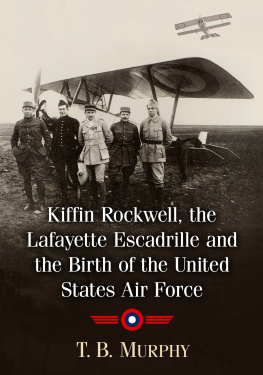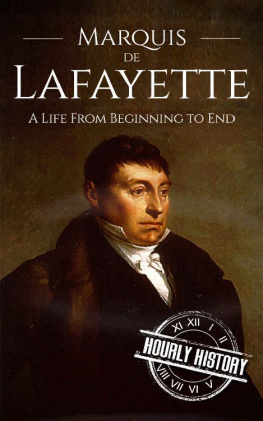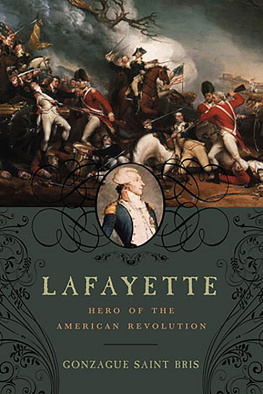Barakaldo Books 2020, all rights reserved. No part of this publication may be reproduced, stored in a retrieval system or transmitted by any means, electrical, mechanical or otherwise without the written permission of the copyright holder.
Publishers Note
Although in most cases we have retained the Authors original spelling and grammar to authentically reproduce the work of the Author and the original intent of such material, some additional notes and clarifications have been added for the modern readers benefit.
We have also made every effort to include all maps and illustrations of the original edition the limitations of formatting do not allow of including larger maps, we will upload as many of these maps as possible.
THE LETTERS
OF
LAFAYETTE AND JEFFERSON
with an introduction and notes
by
GILBERT CHINARD
Professor in the Johns Hopkins University.
Table of Contents
Contents
Table of Contents
REQUEST FROM THE PUBLISHER
PREFACE
The purpose of the series beginning with this volume is simply to make available some documents pertaining to an aspect of international relations which after being long neglected has recently drawn the attention of a few historians and comparatists.
Due to the inroads made by hasty applications of scientific or pseudo-scientific principles into the field of history, there has been in recent years a marked tendency to emphasize unduly the part played by economic factors in the development of a given people and in its relations with neighbor nations. In more than one sense, this conception of history has brought about a healthy and necessary reaction against historians who wrote largely in order to prove the correctness of a priori hypotheses, to satisfy posthumous hatred, or to justify the program of a political party. It is obvious however that because of its ambition to deal only with quantitative and measurable data, economic history presupposes a mechanistic theory of life the soundness of which has yet to be demonstrated. Sometimes it is granted as an unimportant concession, that nations as well as individuals are not exclusively led by the realization of the immediate necessities of life, that emotions and ideas can, in critical times, weigh heavily in the scales of destiny. But too often such considerations are laid aside as not being the proper domain of science and they are left to be dealt with to emotional orators and impressionistic writers.
If this is true of national history it is even more evident in the field of international history. The great emotional pressure which enabled so many nations to carry on through the war, has resulted in a sort of international nervous breakdown from which we are slowly recovering. The necessity of resuming our daily tasks in order to obtain our daily bread has concentrated mans attention on the most pressing problems of the moment. The economic aftermath of the war, the economic consequences of peace have pushed into the background all other considerations, and the financeer has established himself in the center of the city.
Yet anyone who has lived through the last two decades and looks back towards our immediate past, has to admit that there have been times when the great majority of individuals forming a given nation have acted as if they were inspired with entirely different motives. Whether or not, as some seem to believe, the great parade was directed by a few cold calculating minds who pulled the strings from their well protected studies, even if this simpliste idea were true, the fact would remain, that in order to make the masses march in the assigned path, they had to appeal to considerations entirely foreign to economics. There is little doubt that in times of crisis men are led by ideas and by emotions often mistaken for ideas or, as Napoleon repeated after Pascal, by their imagination.
If nations as well as individuals were ruled throughout their existence solely by a single set of unchanging motives, if all of us had single track minds, to write history would be an easy task and the science of government would have become long ago a real science. But varying with individuals, with times and circumstances, complex and manifold motives obtain alternatively. The so-called stream of consciousness has many eddies, and cross-currents, and very often breaking the levees baffles the forecasts of the wiseacres.
To distribute men into a limited number of categories, to assign to each class a fixed label is as attractive an undertaking as it is unscientific, unless room is provided in each category for an infinite number of subdivisions and varieties. Even physicians have to reckon at times with such unexpected phenomena as idiosyncrasies and individual temperaments. But strangely enough these anomalies and exceptions, these infinite nuances are generally ignored by social psychologists and students of the international mind.
Whether there are such things as inborn national or racial characteristics, which would enable one to determine in advance how a Frenchman, a German, a Britisher or an American would react under certain circumstances, is a question which cannot be satisfactorily answered in the present state of our knowledge. As a matter of fact, when these apparently irrefutable and generally accepted judgments are analyzed, they resolve themselves into a confuse mass of contradictions which render impossible any serious classification. The French are called at one and the same breath, logical, emotional, chivalrous, dishonest, generous, imperialistic, highly intelligent and narrow-minded, while the Americans in turn seem to be greedy and wasteful, practical and idealistic, looking forward to the future and unmindful of their past and yet unchanging in their attachment to certain political traditions and to their Constitution. Each of these statements taken separately and applied to any of the individuals composing a nation would probably prove untrue. And yet when taken together, they seem to express to a certain extent the compound of contradictory qualities and faults to be expected of any people formed of individuals.
Furthermore, it is a remarkable fact that to whatever extremes of enthusiasm or hatred a nation may go in her attitude towards another people in times of crisis, the pendulum swings back as soon as the emergency is over, old prejudices, old opinions reappear and reassert themselves and the same attitude of mind as formerly prevails once more.
If this is true, it becomes the obvious duty of the student of international relations not to be content with these verities toutes faites, but to analyze the different elements which compose these commonly accepted truths, to trace historically their development, and thus to test their authenticity and value, in other words, if we knew more exactly, or at least with some degree of approximation, the history of national pride and international prejudices, it might become easier to demonstrate objectively the falsity of many generalizations commonly taken at their face value, and at the same time to find out whether it is possible to discover a common ground upon which some intellectual international entente might be established.
Such an undertaking is probably outside the field history proper, and this may explain why these phenomena have hitherto received so little attention {1} . As a matter of fact, the pioneers in the field are students of comparative literature, and it is probable that this rather undetermined but tremendously rich domain can best be exploited by comparatists and students of international psychology. Before any conclusion can safely be reached, it will be necessary to do a considerable amount of collecting, sifting and publishing the material available. It is essentially a cooperative work to be undertaken simultaneously in several countries by many investigators having the same aim in view. A modest attempt towards the proper solution of the problem may however be undertaken and a beginning can be made,in America probably better than in any other country.








![Roger G. Miller - Like A Thunderbolt: The Lafayette Escadrille And The Advent Of American Pursuit In World War I [Illustrated Edition]](/uploads/posts/book/291189/thumbs/roger-g-miller-like-a-thunderbolt-the-lafayette.jpg)




